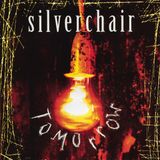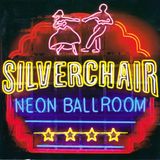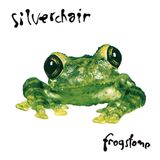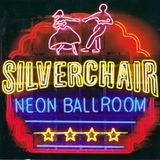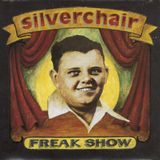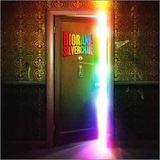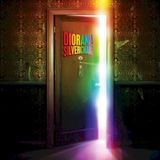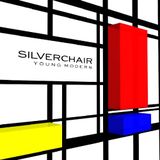Chapter 1
It happened all so fast...
It's the kind of story that's so fanciful that, even over 20 years on, it's still hard to believe that it's true.
Three 15-year-old kids from an unassuming, mid-sized Australian town become the biggest rock'n'roll band in the world in the space of just a few months.
In the mid-‘90s, this was Silverchair's reality.
“The very start of Silverchair was in a very formative part of our lives so it's impacted everything,” Daniel Johns tells Double J's Lindsay McDougall.
“When Frogstomp kind of blew up, that changed what I thought my life was going to be. There wasn't one particular moment but it was like a period of time where I was like, ‘Ok, it's going to be different now.'”
I just thought we were going to do it between working at a fruit market or being a plumber or something.
Daniel Johns
Daniel Johns and drummer Ben Gillies have been mates since they were around seven-years-old.
The two Newcastle kids started jamming in the same way thousands of kids around the world do every day; hanging out, making a racket, having fun.
“I got my first guitar when I was 11,” Johns recalls.
“It was one of those cheap Les Paul rip-off things and I just used to sit there and play in my room.
"Me and Ben started jamming in his lounge room after school.
“Then we got Chris to come and play bass and we migrated to Ben's garage. Sometimes we'd jam in my garage, but it was just garages. We had no intentions of doing anything other than at that point we just loved jamming. We learnt covers and sometimes we'd write little riffs and just jam to them.”
The band called themselves The Innocent Criminals. They played songs by Led Zeppelin, Deep Purple and Black Sabbath and wrote songs inspired by the grunge sound that had been omnipresent since the early-‘90s.
One of those songs, ‘Tomorrow', struck a chord. All of a sudden, things got serious.
They won a competition run by SBS and triple j and were given the opportunity to make a proper recording of the song.
They changed their name to Silverchair, topped the ARIA charts with their debut EP in September of 1994 and became one of the biggest bands on the planet with their debut album Frogstomp in March 1995.
“I never thought we were good enough to be a career band,” Johns says. “I just thought we were just going to do it between working at a fruit market or being a plumber or something.”
I think I'd only seen three bands before we were kind of famous. Straight-edge hardcore bands from Newcastle.
Daniel Johns
Silverchair blew up in the most enormous way imaginable.
Frogstomp landed in the top ten of the Billboard charts, there were screaming girls at every turn, the band played support slots with the world's biggest bands and the media attention was never-ending.
“We honestly had no idea what was going on when all that was happening,” Johns says.
“I think our manager understood the levity of it but we were just like, ‘What the hell?' We actually couldn't comprehend it. I don't think we were smart enough.”
Things got really surreal when the band started playing with their heroes. Even more so when they started playing after the bands they loved.
“There was a couple of shows were it kind of felt like you'd stepped outside of your body. When we were doing shows with the Ramones and Blondie, I was like, ‘How the hell is this even happening?' And then the Chilli Peppers at Madison Square Garden…
“I think we were playing just after Weezer when we were supporting the Chilli Peppers,” Johns says. “All the bands when we were kids, we really looked up to them. We actually didn't think we had a right to be there.”
That feeling is understandable. Not only did Silverchair not have much experience playing shows, they hadn't even been to that many as punters.
“I think I'd only seen three bands before we were kind of famous I guess, and it was mostly straight-edge hardcore bands in Newcastle,” Johns says.
“A friend of mine used to put on hardcore shows, so I saw two bands in front of like ten people, and then next thing you know we're playing at Madison Square Garden with the Chilli Peppers.”
Perhaps the most memorable performance of this early stage of Silverchair was at the 1995 MTV Video Music Awards.
The band were put on a platform outside New York's Radio City Music Hall where they provided the pre-show entertainment.
You get back from a big tour and then put your school uniform on and ride your bike to school.
Daniel Johns
Less than a year after the release of their first single, the 15-and-16-year-olds were up there with Michael Jackson, Bon Jovi, R.E.M., Red Hot Chilli Peppers and Green Day, playing for literally millions of people around the world.
“Yeah, I remember that really well,” Johns says. “That was a bizarre experience! A really bizarre experience!”
But they were still teenagers, which meant they still had to go to school.
One minute you're on TV in front of millions, the next, you're in a Newcastle classroom trying to figure out algebraic equations.
“We would go away for an American tour for six weeks and then always have to come back to try and finish school,” Johns remembers.
“So it would have been a bit of a headfuck. You get back from a big tour and then put your school uniform on and ride your bike to school.”
While they copped some rough treatment from their peers, Johns says there was always plenty of support from the authoritative figures.
“All of our families were very supportive. Our principal at high school was really supportive,” he says.
“But there were some people that made it a bit of a nightmare. We weren't popular at school like you'd would've expect. People really, really weren't happy about the situation.
“Some of the kids at school were cool but most of them were just… you know how at school you would get letters saying, ‘so-and-so is going to beat you up after school.'?
“I've heard stories that some of the people that made my life in particular just an absolute nightmare have told people, ‘Yeah, we went to school together and we were kind of friends' and I've thought, ‘Okay…'.
"I also met one particular guy a couple of years ago, he actually came up and apologised to me and was like, ‘I'm so sorry. I was being such a dick', and I was like, ‘It's all cool mate'.”
Chapter 2
Learn to evolve...
By the late-‘90s, Silverchair had proven they were anything but one hit wonders. Their second album Freak Show continued where Frogstomp left off musically.
Even though hype had died down a little and sales weren't as strong, it was a hugely popular record with a stack of killer radio hits.
But a lot changes between the ages of 15 and 19, and, by 1998, Daniel Johns wanted something different. He wanted to continue writing music, he needed to be able to do it on his terms.
“By [1999 album] Neon Ballroom, that's when I either had to sit down with my band, because I was kind of going through a rough time and said, ‘Alright if it's cool, I'm going to take the reins from here'.”
By the time Johns was writing the fourth Silverchair album, 2002's Diorama, the band was a very different musical entity.
“I had a vision for the band, whether it was right or not,” Johns says. “I don't know, but I just wanted to write by myself and I just moved into a house and tried teach myself piano.
“I was kind of obsessed with songs that didn't have traditional structures. I got so bored if it was a ‘verse, chorus, verse, chorus, middle-eight, double chorus' at the end, which now I'm kind of into but at the time I wanted that many sections as I could cram in.”
At this time, Johns started working with Australian electronic mastermind Paul Mac, who played piano on much of Diorama.
“He was actually really, really, really helpful around that period,” Johns says of Mac's involvement.
“People thought I was crazy and even Paul thought I was crazy as well. But he was like, ‘I really don't understand like what you're doing but I'll try and help facilitate your vision'.
“When I was doing demos for Diorama I was like, ‘Paul can you come up and I'll show you what I can do on the piano and then can you make it sound like a professional would make it sound?'”
John found out he actually wasn't dead and he was up for doing some arrangements. Then, me being me, I said, ‘Well we need to do it in Prague.'
Daniel Johns
Paul Mac wasn't the only big name guest on the record.
Silverchair called upon the legendary Van Dyke Parks – the guy responsible for making records from Donovan, The Byrds, Harry Nilsson and, most famously, The Beach Boys, sound so perfect – in to arrange Johns' orchestra ideas.
“Once I had all the songs and the arrangements and I even had the track listing how I wanted it, I called my manager and I was like, ‘I really want it to sound like The Wizard of Oz. Fantastical and really psychedelic.
“I wanted it to be like really mystical and John [Watson, Silverchair's manager] was like, ‘That sounds like you want Van Dyke Parks. It's such a pity he's dead'.
“I had never really heard of him before to be honest. Obviously I heard the big Beach Boys hit but I'd never really delved into their catalogue. And then I started listening to the Smile stuff – or the Bootlegs at that point [Smile wasn't officially released until 2004] – and I was like, ‘Aww man.'
“And then something happened, obviously John found out he actually wasn't dead and he was up for doing some arrangements. Then, me being me, I said, ‘Well we need to do it in Prague.'”
It wasn't a case of Johns being difficult. He was in one of the world's biggest bands, he needed the next record to sound as good as it possibly could. So he needed the best orchestra.
“I think I actually had a conversation with Van Dyke and he was like, ‘I think the Philharmonia is the best orchestra.' And I was like, ‘Ok, well what do we have to do?' Cause at that stage you could spend money on it like it wasn't a big deal.”
Once I got better, I had a bit of a point to prove.
Daniel Johns
Johns had no reservations about this ambitious new direction.
He was sure he was making great music, he just needed the right people on his side. People like Mac and Parks.
“People that are inherently arty will be up for the challenge,” Johns says.
“It's only the people that really kind of want to drop the E-string down to D and play power chords that just will not be up for it.”
Any trust Johns had from his record label soon diminished, though. He was diagnosed with a serious case of reactive arthritis and was unable to tour on the back of the album.
“I'd been quite sick around the release of Diorama, so we couldn't tour it and the American record company was kind of freaking out. ‘We've put this money behind it. We were really expecting to have a grunge record and then he releases this fruity record and then he gets sick and he can't tour it!'
“Once I got better, I had a bit of a point to prove. So as soon as I could play guitar again then we just said, ‘Alright, we're going to play two sets. We're gonna play for two hours a night, more than two hours sometimes.' We'd go into 12 minute excursions into prog rock.”
Chapter 3
I feel so low, I feel so high...
It was exactly five years between Silverchair's last two albums, with Young Modern not seeing the light of day til March 2007.
At that stage I was just flying people over [to London] and siting in the garden, smoking joints and writing songs. It was a good time.
Daniel Johns
“I took a little bit of a break cause the whole Diorama experience was more than mildly traumatic,” Johns says.
Johns and Paul Mac formed a new group, The Dissociatives, and quickly made a record together.
But, at the same time, Johns was thinking about Silverchair's next move.
“I was writing a lot for [2007's] Young Modern.
"There was tracks like ‘Those Thieving Birds'. Some very eccentric songs that I thought were normal until I played them to people.”
Julian Hamilton [The Presets] had joined Silverchair as a live member for the Across The Night tour in 2003.
In order to bring his music back to earth, Johns tapped into Hamilton's pop smarts. The two proved a hugely valuable writing team.
“I thought, ‘It might be a good idea to give Jules a call and see if we could write some, you know, pop songs.' He's such a great songwriter,” Johns says.
“We wrote ‘Straight Lines', ‘Mind Reader' and ‘Young Modern Station' all in a pretty short period of time. At that stage I was just flying people over [to London] and siting in the garden, smoking joints and writing songs. It was a good time.”
It's interesting that a songwriter as supreme as Johns would open his creative process up to others so readily, but he says the benefits of doing so are clear.
“I was more than capable of doing stuff but I really like it when you make a connection with a musician,” he says. “There's something really special about that energy.
“I do like writing by myself, but when you're writing with someone who you're really kind of connected to something else happens that may not be better but it's different.
“I always have fun with all of those guys... It's kind of like they lift you to another level.”
Chapter 4
After all these years...
Listening to Frogstomp and Young Modern back-to-back is a bizarre experience.
It would have been really fucking easy to just keep repeating the most successful records and just milk it.
Daniel Johns
While there are shared characteristics, the two records almost sound like they're from different bands.
The artistic risks the band took throughout their career is perhaps the one thing Johns is most proud of.
“It would have been really fucking easy to just keep repeating the most successful records and just milk it,” he says.
“I didn't want to do that. I wanted to at least attempt to make an impact on people. Like make people feel better or feel inspired or something.
"But it was never going to happen if we did what all the suits and everything wanted; they just wanted Frogstomp forever. And I was like, ‘Nah. I'm going to be an artist, hey!'”
Maybe Johns is right, but there's a strong argument that suggests his artistic progression was the very thing that allowed such a long and storied career.
People didn't have time to get sick of the band's core sound, because it evolved so rapidly. It wouldn't be the first time the suits were wrong.
While such changes may have been jarring for some, the quality of Johns' songwriting and the faith he had in his own ambition meant the music was good. And isn't that all that matters?
Silverchair are still adored around the world. But Johns can't see the band's hiatus, which began in 2011, ever ending.
“You know, not in a bitter angry way,” he qualifies. “I just feel that was a period of time that was really special and I've just got a million other things that I want to do now.”
Johns released his debut solo album, Talk, last year. He says there is plenty more where that came from.
“There's a lot of things going on at the moment,” he says. “I've just got on this really OCD trip at the moment and just making sure that all of the next five records are ready to go in a year. It seems like I'm doing nothing but I'm doing a lot.”
Five albums is ambitious, but Johns is flexing his creative muscle in every way he can.
“They're all completely different,” he says of the new material. “I've got a record with Luke Steele coming really soon. I've got another record coming with Jake [Meadows] who plays harp in the Talk band. Another record coming with another guy who I literally met a week ago. And, obviously, I would really love to do another solo record.”
No matter his next step, we're certain it'll be yet another creative evolution. Johns doesn't know any other way.


